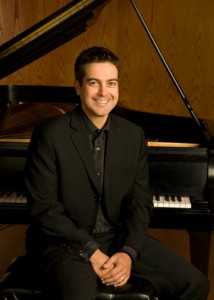The NOVA Chamber Music Series opens its 2011-12 season Sunday with a program that brings together an interesting mix of composers. “You don’t really associate Brahms, Wagner and Franck, but it turns out this works really well,” NOVA director and Utah Symphony principal keyboard Jason Hardink told Reichel Recommends.
Johannes Brahms and Richard Wagner were diametric opposites in their approach to music. Wagner was forward thinking and continued along the lines of the harmonic, tonal and thematic expansion seen in the music of Ludwig van Beethoven, Hector Berlioz and Franz Liszt.
Brahms, on the other hand, looked back and saw the classical structure of Beethoven’s music and didn’t break new ground. But Hardink nevertheless considers Brahms a “progressive” composer. “Looking back is actually progressive,” he said. “Composers in the 20th century looked back to earlier styles and forms. That’s what neo-classicism is about. And when you think about it, only 30 years separate the late works of Brahms from Stravinsky’s early neo-classical pieces.”
And César Franck’s place in the musical pantheon is squarely between Brahms and Wagner. “In outlook he follows the tradition of Brahms,” Hardink said. “But his chromatic harmony is Wagnerian. His music is an interesting melding together of these two composers.”
The Belgian born Franck spent his creative life in France and defied convention. While most French composers of the time were focused on writing opera, Franck’s stage output was minimal. Instead, most of what he wrote was instrumental. And he followed principals laid down by German composers. The two most important Germans writing music in the second half of the 1800s were Brahms and Wagner – and those were the two Franck admired. He didn’t see anything inherently wrong in mixing these two very different composers. And what Franck wrote was imaginative and creative. “He had the outward appearance of Brahms and the inward style of Wagner,” Hardink said.
The concert will open with Brahms’ Violin Sonata in D minor, op. 108, followed by Wagner’s Siegfried Idyll. The second half features Franck’s Piano Quintet in F minor.
NOVA was designed with the members of the Utah Symphony and other local musicians in mind, and Hardink has kept that goal uppermost in mind when he programs concerts. “We have a deep pool of gifted musicians in this state and this is their venue,” he said, adding that Sunday’s concert was planned around Utah Symphony violinist David Langr. “He wanted to do the Franck, which he’ll be playing with me, and he’ll be the concertmaster of the ensemble that will play Wagner’s piece.” The chamber group performing the Siegfried Idyll will be conducted by Utah Symphony principal bass David Yavornitzky. “There is always the question of whether or not to use a conductor in this piece,” Hardink said. “We decided to go with a conductor for the flow and pacing.”
CONCERT INFO:
Venue: Libby Gardner Concert Hall, University of Utah
Time and Date: 3 p.m. Oct. 23
Tickets: $82 general, $70 seniors (season); $18 general, $15 seniors, $5 students (individual)
Phone: 801-463-5223

